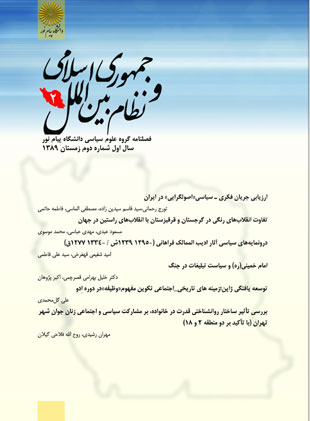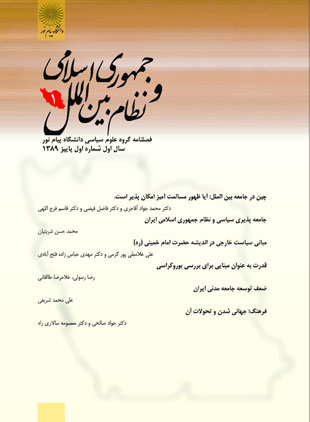فهرست مطالب

فصلنامه جمهوری اسلامی و نظام بین الملل
پیاپی 2 (زمستان 1389)
- تاریخ انتشار: 1389/10/11
- تعداد عناوین: 6
-
صفحه 4نشانه شناسی یکی از روشهای پذیرفته شده در شناخت پدیده های سیاسی است. پس از انقلاب اسلامی، در ایران برخی واژه ها و مفاهیم دارای بار سیاسی را می توان به مثابه نشانه هایی در نظر گرفت که توانستند برخی جریانهای فکری سیاسی را توضیح دهند. مقاله حاضر تلاش میکند با تاکید بر برخی مفاهیم و واژه های متعلق به جریان فکری سیاسی اصولگرایی، این جریان را ازطریق روش نشانه شناسی بررسی کند.
کلیدواژگان: نشانه شناسی، اصولگرایی، مردم، ولایت فقیه، اسلام -
صفحه 24انقلاب رنگی، به تغییر الگوی مسالت آمیز و به دور از خشونت حاکمان گفته می شود. با بررسی موردی انقلاب رنگی در کشورهایی که دستخوش این دگرگونی بوده اند می توان به این نتیجه مهم دست یافت که آنچه منطق درونی این الگو را تشکیل داده بهره گیری از گزینه میانی است، انقلاب رنگی به مشابه الگوی تغییر حاکمان، بر نفی دوگانه سازی های کاذب گذشته اعم ازگزینه دوگانه «انقلاب و اصلاح» بنا شده است. بر این اساس با فروپاشی اتحاد جماهیر شوروی سابق و شکل گیری کشورهای تازه استقلال یافته گرجستان و قرقیزستان رژیم هایی پدید آمد که با مشکلات سیاسی، اقتصادی قابل توجهی روبه رو بودند. در این میان آمریکا برای اجرای هداف خود در منطقه آسیای مرکزی و قفقاز به حضور در این منطقه نیاز داشت تا از طریق سازمان های ظاهرا خصوصی با بهره گیری از مشکلات سیاسی و اقتصادی موجود کشورها به نفوذ بیشتری دست یابد.این مقاله به آنچه در سال های 2003 و 2005 در گرجستان و قرقیزستان رخ داد و به«انقلاب رنگی» مشهور شده است پرداخته و تفاوت آن را با دیگر انقلابهای راستین در دنیا نشان می دهد.
کلیدواژگان: انقلاب، انقلاب رنگی(گل رز، نارنجی)، انقلاب واقعی، گرجستان، قرقیزستان، سازمان های خصوصی، (Ngoc) -
صفحه 49ادبیات و شعر مشروطه، عمدتا ادبیاتی متعهد، دور از دربار، با زبان مردمی، دارای موضوعات جدید و متاثر از حوادث زمانه محسوب می گردد. ادیب الممالک فراهانی نیز یکی از ادیبان بزرگ آن دوران بوده و در کنار دیگران، و با اثرپذیری از حوادث و افکار زمانه اش، دوره جدیدی از ادبیات سیاسی فارسی را رقم زده است. این مقاله برای تبیین صبغه سیاسی افکار ادیب در صدد است به بررسی مسائلی همچون تجددخواهی، عدالت، ناسیونالیسم و وطن پرستی، آزادی خواهی و قانون مداری، وحدت، اخلاق و سیاست، ونیز آگاهی بخشی برای پیشرفت، در آثار وی بپردازد.
کلیدواژگان: ادیب الممالک فرهانی، نقش قانونی، ادبیات فارسی، قانونگرایی -
صفحه 79پس از پیروزی انقلاب اسلامی، استکبار جهانی از راه های مختلف، به مقابله با ملت ایران پرداخت؛ از آن جمله، هشت سال جنگ تحمیلی عراق علیه ایران، و پشتیبانی کامل نظامی و تبلیغاتی از رژیم بعثی عراق بود. رهبر کبیر و بنیانگذار جمهوری اسلامی ایران در طول دوران دفاع مقدس، با هوشیاری کامل در مقابله با تبلیغات وسیع و پرحجم دشمن، مواضع اندیشمندانه و سنجیده ای اتخاذ کردند: که بررسی و دقت نظر علمی آن همانند دیگر موضوعات به جا مانده از آن رهبر یگانه، ضروری به نظر می رسد. ما در این مقاله به موارد مدیریت تبلیغات جنگ، به عنوان یک عنصر مهم، که از «استراتژی بزرگ» هر کشوری در زمان جنگ محسوب می-شود و برخی صاحب نظران، تبلیغات جنگ را تار و پود تاکتیک، لجستیک و استراتژی نظامی نامیده اند، پرداخته ایم و اثبات کرده ایم که بدون یک مدیریت موفق تبلیغات جنگ، فرماندهی جنگ، قادر به هدایت و رهبری و اداره امور جنگی نخواهد بود.
کلیدواژگان: امام خمینی(ره)، تبلیغات جنگ، مدیریت تبلیغات جنگ، استراتژی، امنیت تبلیغات، مقابله باتهاجم تبلیغاتی -
صفحه 101این مقاله در پی تبیین زمینه های تاریخی اجتماعی تکوین مفهوم «وظیفه» در دوره ادو به عنوان یکی ازعلل توسعه یافتگی ژاپن است. از جمله بارزترین رفتارهای اجتماعی مردم ژاپن «وظیفه شناسی» و «مسئولیت پذیری» است؛ از دیگر برجستگی های مهم ژاپنی ها قابلیت وتوانایی آنها در اقتباس و منطببق ساختن خود با شرایط جدید همزمان با شخصیت، سنت و روش زندگی خودشان است. با بررسی دوره «ادو» ساختارهای اجتماعی فکری این دوره مشخص می شود؛ اهتمام به «وظیفه» ومسئولیت پذیری در قبال نقشی که در جامعه امروزی بر عهده فرد نهاده شده است، ریشه در گذشته تاریخی ژاپن دارد حاکمان دوره ادو با هدف ایجاد وحدت در ژاپن، برقراری صلح و آرامش و البته تحکیم پایه های قدرت خود در جامعه تمهیداتی را اتخاذ کرده و ساز و کارهایی را اندیشیدند که ضامن اهداف مورد نظر خود باشد.کلیدواژگان: ژاپن، توسعه یافتگی، دوره ادو، وظیفه، نظام ککوداکا
-
صفحه 142این مقاله در پی پاسخ به این پرسش است که کدام نوع از ساختار قدرت در خانواده، در کاهش مشارکت سیاسی و اجتماعی تاثیر دارد؟ ساختار قدرت در خانواده، به سه بخش تقسیم شده است: تقسیم کار جنسی، ایدئولوژی سنتی خانواده، الگوی تصمیم-گیری در خانواده. به علاوه برای سنجش اطاعت پذیری افراد در برابر خانواده از مقیاس فاشیسم استفاده شده است. به این منظور، در اینجا پنج فرضیه آزمون پذیر به-کار رفته است. جامعه آماری مورد بررسی این پژوهش، زنان جوان بین15 تا 19ساله در دو منطقه 2 و 18 شهرستان تهران و حجم نمونه هم برابر با 384 نفر است. در این مقاله که تمامی فرضیه ها تایید شده است. به عبارتی هرچه ساختار قدرت در خانواده دموکراتیک تر باشد، مشارکت سیاسی و اجتماعی هم بیشتر می شود.
کلیدواژگان: مشارکت سیاسی، مشارکت اجتماعی، ساختار قدرت، خانواده، مقیاس فاشیسم
-
Page 4Semiotics is one of the popular ways for understanding political phenomena. Some of the terms and concepts with political implications which became popular after the Iranian Revolution can be regarded as signs that can explain some political and intellectual trends. The present study aims to analyze the political and intellectual trend of principlism through semiotics by concentrating on some of the terms and concepts which are related to this trend.Keywords: semiotics_principlism_people_Velayat e Faqih_Islam
-
Page 24The term “color revolution” is applied to the peaceful transition of power. By examining the color revolution in countries which have been subject to it, it can be concluded that the central logic in these revolutions is the employment of the intermediary choice. Color revolution, as a model for transition of power, is based on the negation of false dichotomies of the past, such as the “revolution/reformation” dichotomy. After the disintegration of the Soviet Union, countries such as Georgia and Kirgizstan were formed which face serious political and economic problems. To achieve its goal, the US needed to make its presence felt in Central Asia and the Caucasus, so that it could benefit from the political and economic problems of these countries and play a noticeable role in this region through seemingly private organizations. This article aims to study what was later called color revolution in Georgia and Kirgizstan in 2003 and 2005, and highlight its difference with true revolutions.Keywords: revolution, color revolution (Rose, Orange), true (Ngoc) revolution, Georgia, Kirgizstan, private organizations
-
Page 49Adib Almamalek Farahani is one of the influential literary figures of the Constitutionalism Era in Iran. This era marks the beginning of great intellectual and political changes in Iran. Farahani is one of the figures who gradually changed his traditional ideas into modern ones. Concepts such as justice, the rule of law, which were rooted in the new circumstances of society, can be found in Farahani’s poetry that can be regarded as a literary revolution in Persian poetry; these concepts gradually dominated the mentality of the people and turned into slogans for the reformist movements. Farahani combines ethics and politics, and illustrates approaches for political unity. According to him, seeking freedom and complying with the rule of law are among the characteristics of enlightened people.Keywords: Adil Almamalek Farahani, rule of law, constitutionalism, Persian literature, Malek Alshoara Bahar
-
Page 79After the Iranian Revolution, world powers opposed Iran in different ways, such as by supporting the Iraqi regime in the Iranian-Iraqi war. The Iranian leader, Ayatollah Khomeini, countered the propaganda of the enemies of Iran wisely and took effective measures against it. In this article we analyze the management of propaganda of war as one of the major elements of the “great strategy” of each country; some experts call propaganda in war the pivot point of military logistics and strategy. We have proved in this paper that without managing the war propaganda successfully, no war can be guided and controlled efficiently.Keywords: Imam Khomeini_war propaganda_the management of war propaganda_strategy_the security f propaganda_countering propaganda battle
-
Page 101This article aims to illustrate the socio-historical backgrounds of evolution of the concept of duty in Edu Era, as one of the reasons for the development of Japan. One exemplary behavior of the Japanese is their dutifulness and responsibleness; another significant aspect of them is their ability to adapt their personality, tradition and lifestyle with new circumstances. By studying the Edu Era we try to illustrate the social and intellectual structures of this era. Their commitment to their duties in modern society and their responsibleness, are rooted in the historical past of Japan. In order to foster unity in Japan, secure peace and stabilize their rule, the ruler in this era took appropriate measures which led to the fulfillment of their goals.Keywords: Japan, development, Edu Era, duty, Kekudeka sysyem
-
Page 142This article aims to provide an answer to the question, “what kind of structure of power in family can affect social and political participation?” The structure of power in family is divided into three groups: the division of gender-based work, the traditional ideology of the family, the pattern of decision-making in the family. To analyze the degree of obedience to the family, the factor of fascism is used. For this purpose, five testable hypotheses are examined. The statistical society includes the young women ranging in age from 15 to 29 who live in 2nd and 18th districts of Tehran. The statistical population is 384 people. In this study all hypotheses are proved. In other words, the more democratic the structure of power in the family is, the more social and political participation is fostered.Keywords: political participation, social participation, the structure of power, family, fascism factor


